Keyword Difficulty Checker: The Most Accurate Keyword Difficulty Tool
Find out how hard it is to rank on the 1st SERP for hundreds of keywords with the most accurate keyword difficulty checker!
What is keyword difficulty?
Keyword difficulty (also known as keyword competition or SEO difficulty) is an SEO metric that estimates how difficult it is to rank for a keyword.
The higher the keyword difficulty, the harder it is to rank on the first SERP due to the high competition from the ranking websites.
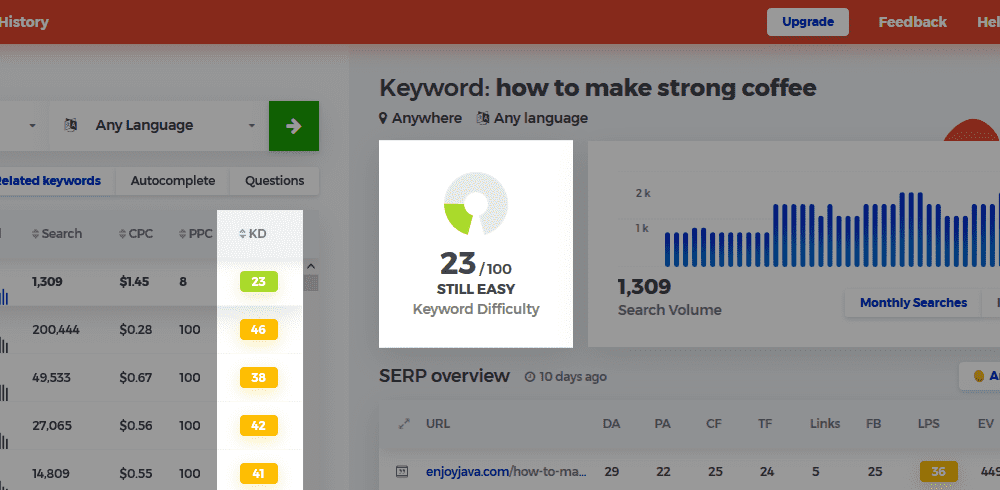
There are many factors (both external and internal) that influence the degree of keyword difficulty, including the quality of the competitors’ pages and the quality of your page.
The term is usually used with two slightly different meanings:
- Keyword difficulty as a metric on a scale from 0 to 100
- Keyword difficulty as a general term that takes into account all SEO aspects (both internal and external)
Why is keyword difficulty important in SEO?
Many beginner bloggers or website owners choose a keyword, write great content, and optimize the page, only to find out that they’re not ranking at all. The most common reason is that the competition is too fierce.
This is why your keyword research process should always account for keyword difficulty.
By keeping an eye on keyword difficulty, you’ll:
- Get a good overview of the “hot” keywords and the “big” players in your niche
- Be able to identify alternative keywords in your niche that you actually have a chance to rank for
- Save a lot of time by focusing on keywords that can bring you results, even if your website doesn’t have much authority yet
Keyword difficulty as a metric
Very often, the term "keyword difficulty" refers to the metric used in SEO tools that scores the ranking difficulty of each keyword on a scale from 0 to 100.
It works quite simply: the higher the score, the more difficult it is to rank for the keyword.
Note: Google Keyword Planner has a metric called "Competition." Please note that this metric estimates the competition for paid keywords in PPC campaigns and has nothing to do with organic results and SEO.
In KWFinder, the difficulty scores are also differentiated by color to help you navigate the list of keywords more easily.
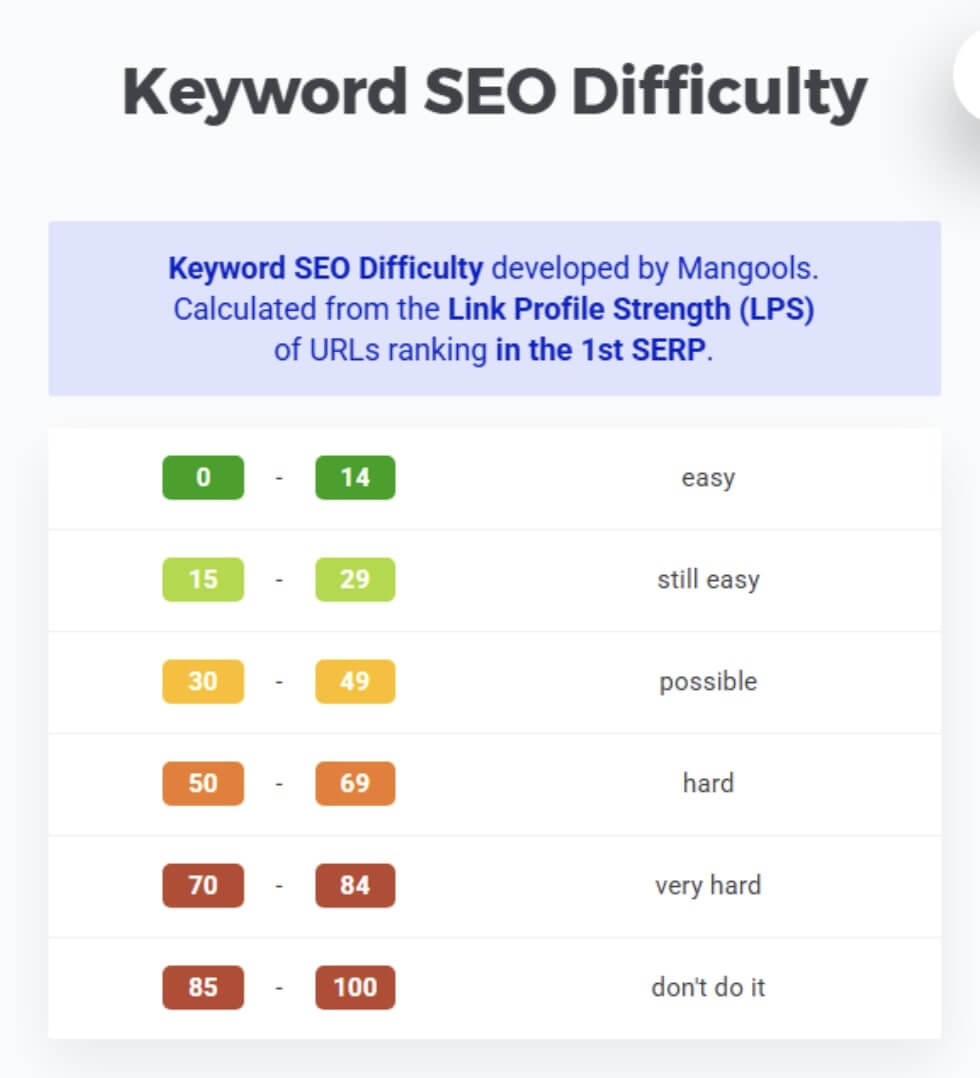
How is keyword difficulty calculated?
When quantifying the competition of a keyword into a metric, only one aspect of website quality is taken into consideration—the backlink profile.
Each website ranking on the first SERP is given a certain score based on the quality and quantity of its backlinks.
The authority of your competitors can be measured in various ways. In KWFinder, you can find the Link Profile Strength metric, which estimates the quality of the website’s link profile.
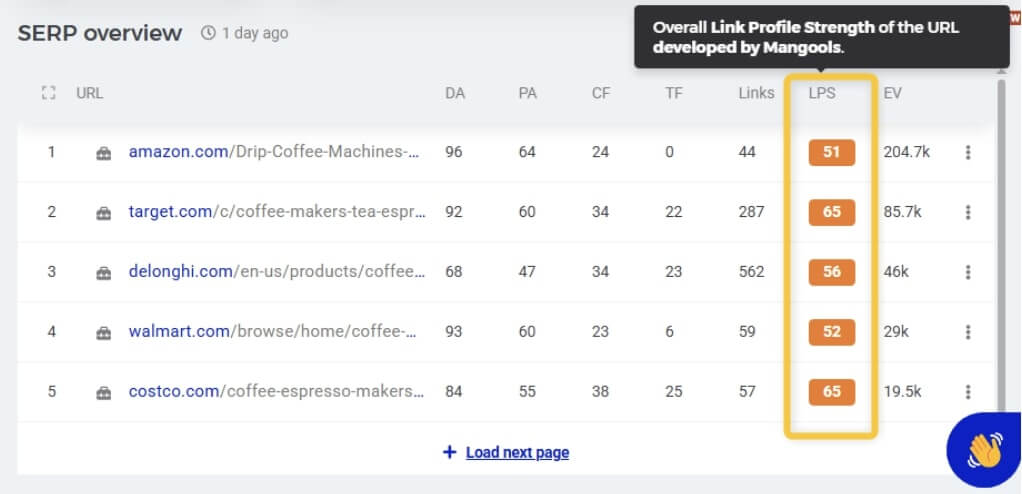
The calculation is based on selected metrics from Moz, Majestic, and our own know-how, namely:
- Domain Authority
- Page Authority
- Citation Flow
- Trust Flow
After that, the average score is calculated to give one final value that gauges how hard it is for a website to break into the first SERP for this term.
The calculation consists of the following steps:
- We calculate the overall Link Profile Strength (LPS) for every website that ranks on the first Google SERP based on the selected Moz and Majestic metrics.
- Each metric has a different weight to ensure the results estimate how real rankings evolve as accurately as possible.
- Finally, we take into account both high and low LPS values to calculate the overall Keyword SEO Difficulty.
- The final value estimates how hard it is to start ranking on the first SERP, so it takes websites with low LPS into consideration more than ever.
- It’s absolutely normal for a low-authority website to outrank high-authority websites, and that’s exactly what Keyword Difficulty focuses on.
Keyword difficulty as a general term
When estimating how hard it will be for you to rank for a certain keyword, you need to consider a couple of factors, both internal and external.
The most important factors are:
1. Your competitors
SEO is all about outranking your competitors.
So, looking at the competing websites is one of the best ways to estimate the difficulty of ranking for a keyword. You should focus on the quality of their:
- Content quality
- On-page optimization
- Backlinks
Backlinks are still a very important ranking factor, so they provide a good estimation of how hard it will be to rank for a keyword.
It’s also the only factor that can be measured and put into a metric. That’s why estimating the keyword difficulty is often reduced to finding out how authoritative (in terms of link profile) your competitors are.
The more authority the websites ranking for a keyword have, the harder it will be for you to outrank them.
2. Authority of your website
Besides your competitors, your ability to rank for a keyword is also determined by the authority of your own website.
This is especially important to keep in mind if you have a new website. Even if the competition for a keyword is relatively low and you write a great piece of content, you probably won’t rank with your brand-new site that has zero backlinks.
Note: There are a couple of metrics that try to estimate the authority of a website or a specific page (e.g., Domain Authority/Page Authority by Moz or Citation Flow/Trust Flow by Majestic).
Remember that these metrics are not used by Google in any way and only serve as a guideline for you. Make sure to compare the values within one metric.
3. Quality of your content
There’s another side of the coin—the authority of your website won’t help you if the quality of your content cannot compete with the pages ranking on the first SERP.
You should ask yourself these questions:
- How hard will it be for me to write content that is of equal or better quality than the competing pages?
- Can I provide the same level of expertise as my competitors?
- Is there any benefit I can provide to the readers compared to my competitors? (quality, depth of knowledge, unique data, visuals, etc.)
All of these are subjective factors that contribute to the overall level of keyword difficulty in your specific case.
4. Search intent
Last but not least, you should consider the search intent behind the search query.
In other words, what kind of content are people who use a particular keyword expecting?
There are four basic types of search intent:
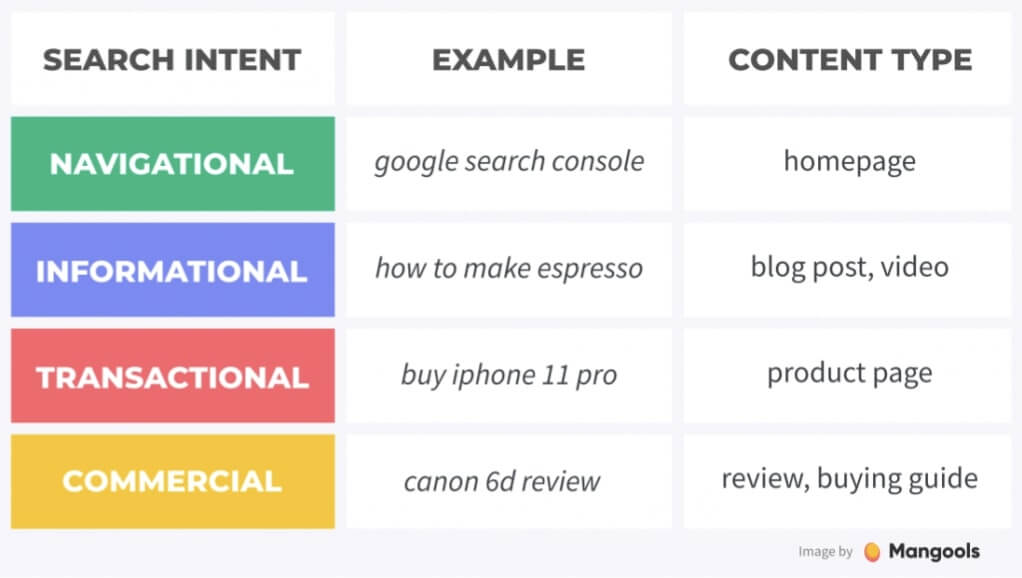
So, how do you find out the search intent behind the keyword?
The easiest way is to “reverse engineer” it by looking at the search results and seeing what kind of pages are ranking for the keyword.
If your keyword is “best air humidifier” and all the pages on the first SERP are reviews, you most likely won’t rank for that keyword with your e-commerce landing page—even if your website is more authoritative and your content is better optimized.
How to check keyword difficulty?
In Mangools KWFinder, you can check and evaluate keyword difficulty for any relevant search query right from the beginning.
All you have to do is enter your seed keyword (or competitor's URL). KWFinder will then show you a list of all relevant keywords with the KD metric in the column within the main table.
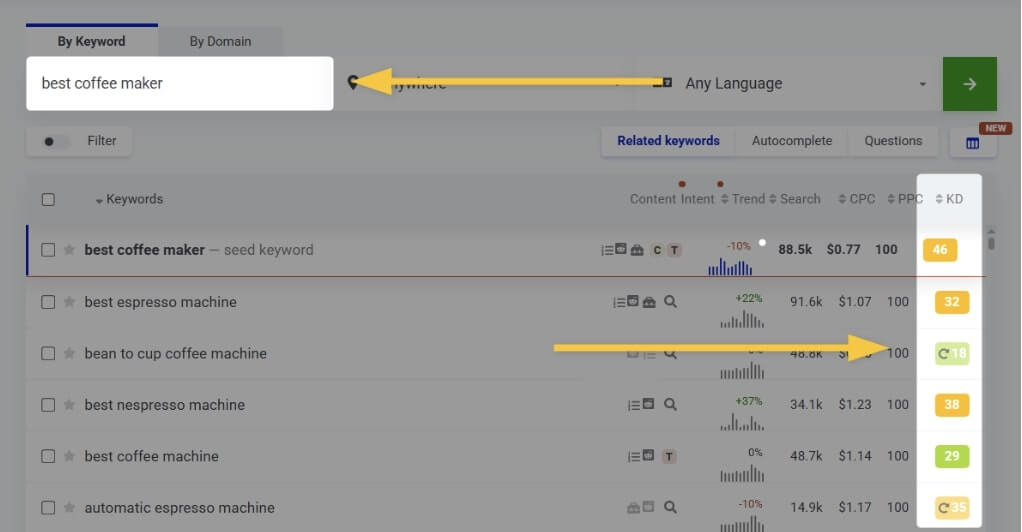
If you want to find relevant keywords with lower SEO difficulty that you can actually rank for with your website, use the “Filter” option to set the MIN-MAX range of the KD metric.
KWFinder will then display only the keywords whose difficulty falls within the specified range.
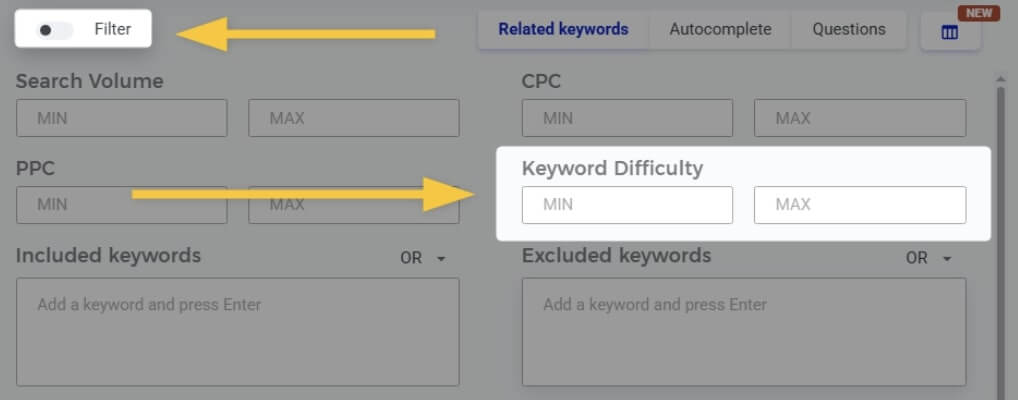
You can also analyze the keyword difficulty of each keyword individually and check if your webpage could actually rank for a given keyword by using our Relative Keyword Difficulty (RKD) metric.
The Relative Keyword Difficulty (RKD) estimates how hard it will be to rank for a certain keyword with a specific URL based on its link strength.
To do this, simply:
- Select any relevant keyword within the table.
- Click on “Relative values” on the right.
- Enter the URL you would like to rank with for the given keyword.
- Click on the “Set URL” button.
KWFinder will then re-evaluate the KD of the query based on the link profile of your webpage..
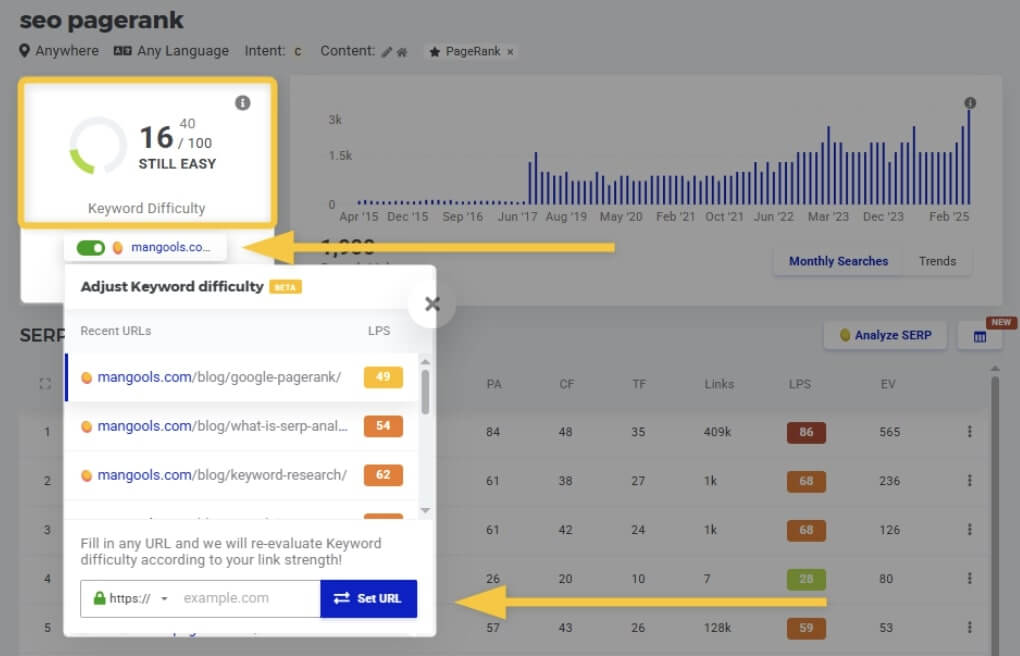
How to use keyword difficulty in your SEO strategy
1. Look at the big picture
Keyword difficulty is only one of the aspects you should consider when doing keyword research.
The other two important aspects are the popularity of the keyword and its relevance.
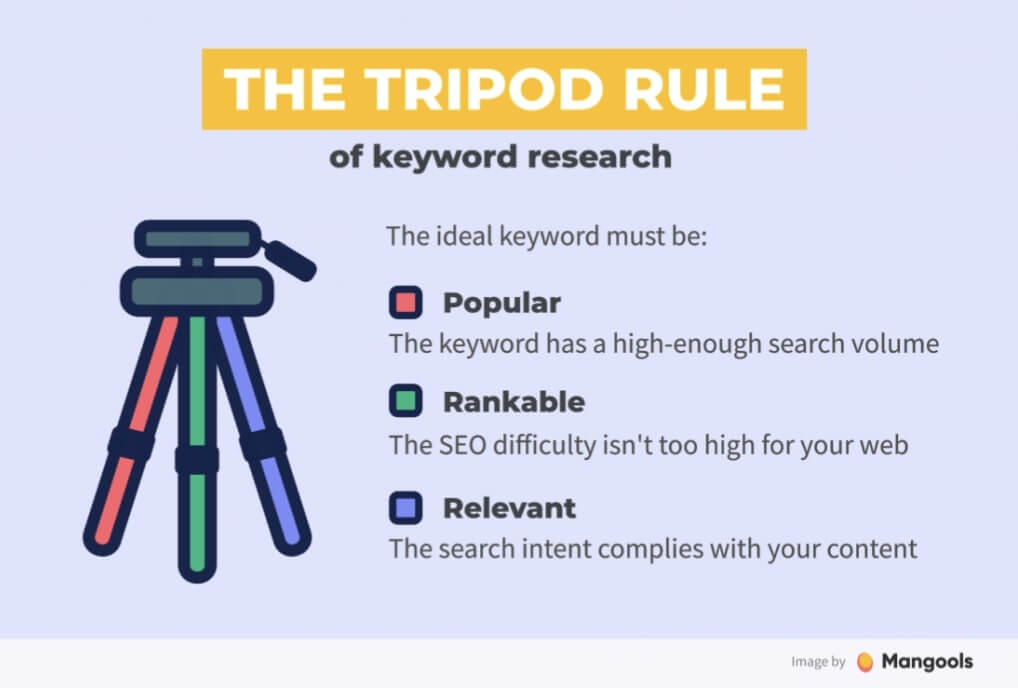
If there’s low difficulty but the keyword has no search volume, you won’t get any traffic.
On the other hand, without relevance, you will not rank for the keyword even if the difficulty metric is low, because the search intent doesn’t match your type of content.
2. Analyze the SERP results
Never rely on a single number given by a keyword tool. The keyword difficulty metric is there to give you a quick overview—not to replace competitor research. In other words, SERP analysis is non-negotiable.
Besides the difficulty metric, always look at the SERP results and the actual websites that rank for the keyword.
You’ll learn much more about the search intent, the type of content that ranks for the keyword, as well as how deeply your competitors cover the topic.
You may also notice, for example, that the top positions are taken by “big brands” (e.g., Amazon, Pinterest, YouTube) with high authority, which may not be reflected in the 0-100 metric but will influence your ability to rank for the keyword at the top.
That being said…
3. Don’t be afraid of high difficulty
The keyword difficulty metric alone shouldn’t deter you from trying to rank for a keyword with medium or higher difficulty.
It’s more about getting a general sense of what you’re up against and determining what you need to do to make your page a viable competitor.
Here are a couple of things that can help you rank for a highly competitive keyword:
- Outstanding content – You may outrank highly authoritative competitors with quality content that shows better expertise and covers the topic in a much deeper way.
- Topical relevance – Having a narrowly oriented website with quality internal links can help you outrank authoritative websites that cover the topic only sporadically and rank mostly due to their overall brand authority.
- Quality backlinks – A high number of quality backlinks to a specific page can help you rank for that page, even if your overall domain authority is lower.
4. Compare the values within one tool
There are many keyword research tools available, and each may use a different backlink database or a different method of calculating keyword difficulty.
Therefore, the keyword difficulty scores may differ from tool to tool, so it’s important to compare the values within a single tool.
In addition, Keyword Difficulty isn’t the only metric on which you should base your keyword research.
You're on the right track once you've created a list of relevant keywords for your niche with low Keyword Difficulty. However, this doesn’t mean your job is done.
You should also consider other metrics, such as search trends, average monthly search volumes, CPC, and PPC competition (you can find these in the left panel of KWFinder).
Try KWFinder now
Get hundreds of keyword ideas with one click.
Explore all features of KWFinder
- Local keyword research
- The most accurate keyword difficulty
- Search volume and keyword metrics
- SERP analysis and SEO metrics
- Keyword Planner alternative